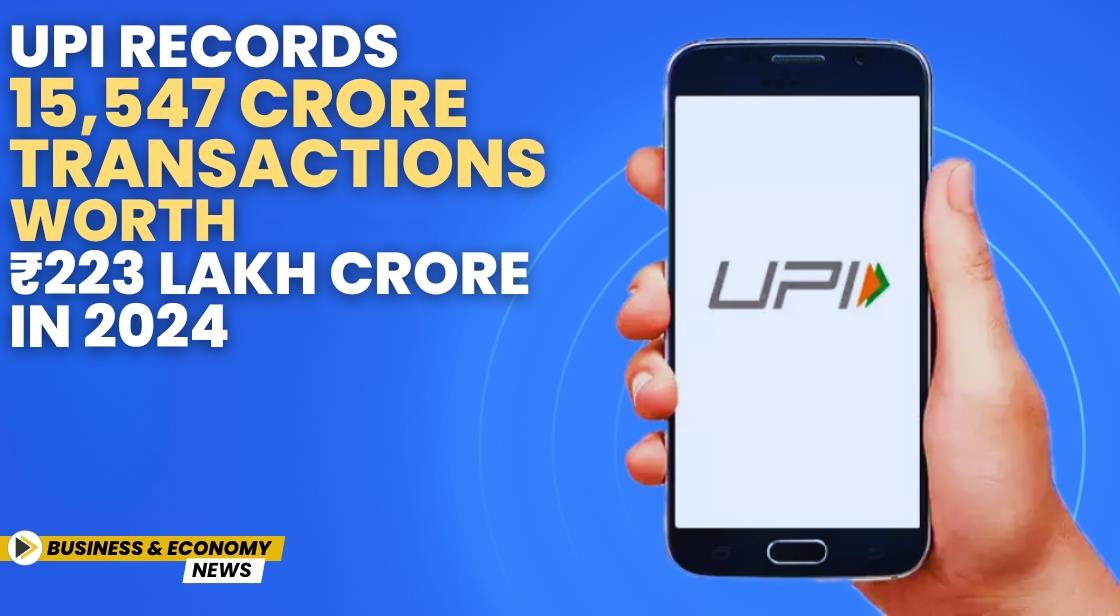UPI Records 15,547 Crore Transactions Worth ₹223 Lakh Crore in 2024

News Synopsis
The Unified Payments Interface (UPI) has achieved an extraordinary milestone, processing 15,547 crore transactions worth ₹223 lakh crore between January and November 2024. Announced by the Ministry of Finance on Saturday, these figures underline UPI's transformative impact on India's financial ecosystem.
Government Recognition of UPI’s Role
In a social media post on X, tagged with #FinMinYearReview2024, the Finance Ministry emphasized UPI's growing significance, both domestically and globally. The post highlighted UPI as a symbol of India's digital payment revolution and its expanding influence across borders.
UPI’s International Expansion
UPI's reach now spans seven countries, including the UAE, Singapore, Bhutan, Nepal, Sri Lanka, France, and Mauritius, showcasing India's push toward global digital payment solutions. Notably, its entry into France marks a pivotal moment as the system gains a foothold in Europe, enabling seamless transactions for Indian users abroad.
Launched in 2016: A Digital Payment Revolution
Introduced by the National Payments Corporation of India (NPCI) in 2016, UPI has transformed India’s payment ecosystem. The platform integrates multiple bank accounts into a single mobile application, allowing users to perform instant money transfers, merchant payments, and peer-to-peer transactions with ease.
October 2024 Milestone
In October 2024, UPI achieved a historic feat by processing 16.58 billion transactions worth ₹23.49 lakh crore in just one month, representing a 45% year-on-year growth from October 2023. These impressive figures reflect UPI’s growing dominance, with 632 banks now connected to its platform.
Empowering Small Businesses and Individuals
UPI has proven invaluable to small businesses, street vendors, and migrant workers by providing them with an efficient, cashless way to conduct transactions. The Covid-19 pandemic further accelerated UPI's adoption, as users sought secure, contactless payment alternatives.
Driving Behavioral Change Toward Digital Payments
The success of UPI is not just about its infrastructure but also the trust and accessibility it offers. Its widespread adoption signifies a behavioral shift toward digital payment systems, enabling financial inclusion for millions.
India Leads Global Real-Time Transactions
According to the ACI Worldwide Report 2024, India accounted for 49% of global real-time payment transactions in 2023, underscoring its leadership in digital payment innovation.
UPI’s Global Expansion Through BRICS
Prime Minister Modi has championed UPI's adoption within the BRICS grouping, which now includes six new member states. This initiative is expected to enhance cross-border remittances, strengthen financial inclusion, and elevate India's position in the global financial ecosystem.
Conclusion
The Unified Payments Interface (UPI) has emerged as a game-changer in India's financial landscape, driving a significant transformation in how payments are made across the nation. With record-breaking transaction volumes and an expanding international presence, UPI's success is a testament to the robust infrastructure, trust, and accessibility it offers to users. The platform's ability to seamlessly integrate multiple bank accounts, facilitate instant transactions, and empower individuals and businesses, particularly during the pandemic, has paved the way for a cashless economy.
UPI's continued growth, both domestically and globally, positions India as a leader in digital payment innovation, as highlighted by its dominance in real-time payment transactions. The ongoing efforts to expand UPI within the BRICS countries further reinforce its potential to enhance financial inclusion and streamline remittance flows. With UPI’s expansion into markets like France, India is solidifying its role as a pioneer in the global digital payment revolution, shaping the future of financial transactions worldwide.
You May Like









